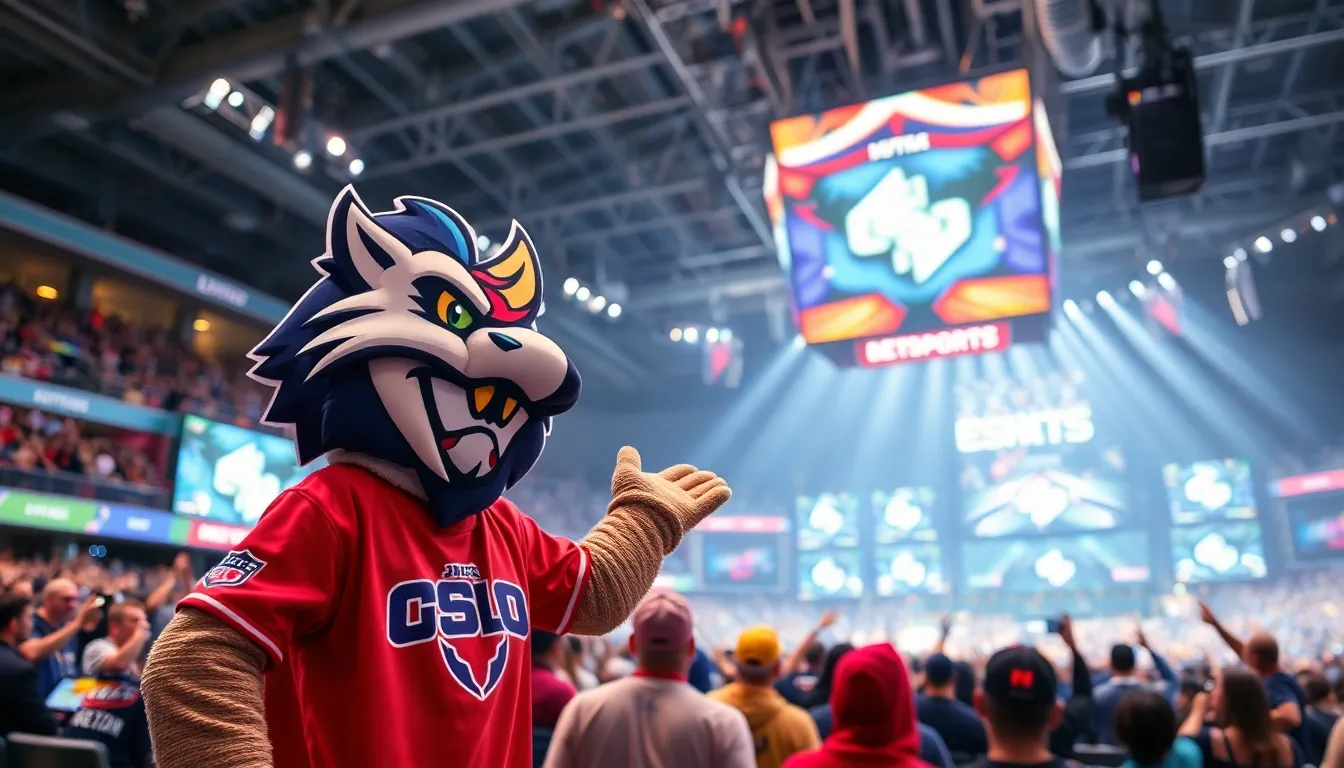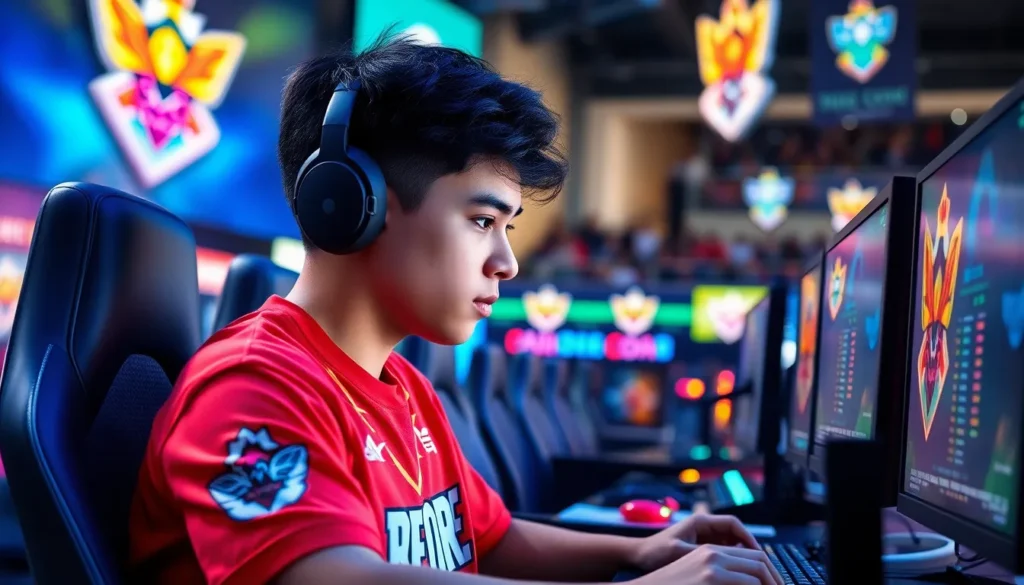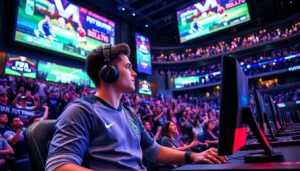In the fast-paced world of esports, where every pixel counts and every second matters, branding can make or break a team. Imagine your squad dominating the arena, but their logo looks like it was designed in a high school art class. Not exactly a winning strategy, right? Effective branding isn’t just about flashy graphics; it’s about creating a memorable identity that resonates with fans and instills fear in opponents.
From team colors to catchy slogans, branding shapes perceptions and builds loyalty. In a landscape teeming with competition, a strong brand can turn casual viewers into die-hard supporters. So, whether you’re a newbie team looking to make a splash or a seasoned pro aiming to refresh your image, understanding the art of esports team branding is crucial. Buckle up as we dive into the essentials of crafting a brand that not only stands out but also stands tall in the esports arena.
Table of Contents
ToggleImportance Of Esports Team Branding
Esports team branding plays a crucial role in defining a team’s identity and success. A strong brand creates a memorable image that not only attracts fans but also helps teams stand out in a competitive market. Effective logos capture attention and evoke emotions, making them unforgettable for supporters.
Branding influences perceptions among fans and potential sponsors. A well-crafted identity communicates professionalism and commitment, which can lead to new sponsorship opportunities. Teams with a recognized brand often enjoy increased fan loyalty, as supporters feel a deeper connection to the team’s mission and values.
Cohesive branding strategies foster community. They encourage fan engagement through merchandise, social media, and events. When teams present a unified image, fans are more likely to join them on their journey, creating a sense of belonging.
Branding aids in marketing efforts. It simplifies communication about a team’s goals, achievements, and events. Clear messaging resonates better with the audience, making it easier to promote matches and tournaments effectively.
A well-defined brand can intimidate opponents. When a team enters the arena with a polished image, it signals confidence and readiness. This psychological edge can heighten a team’s performance and determination during competitions.
Investing in branding brings long-term benefits. Teams that prioritize their identity experience growth in fanbase and recognition. Establishing an innovative image leads to sustainability in the ever-evolving esports landscape.
Key Elements Of Successful Branding

Effective branding requires attention to key elements that enhance a team’s visibility and connection with fans. These elements include logo design, team colors, and mascots or characters, each playing an essential role in building a recognizable identity.
Logo Design
Logos serve as the visual cornerstone of a team’s brand. A well-designed logo captures attention, evokes emotion, and represents the team’s values. Recognition increases when logos are simple yet memorable. Effective logos often incorporate unique shapes or symbols that resonate with fans, creating a deeper connection. Utilizing professional design services ensures quality, leading to a polished and professional appearance. This visual representation becomes essential in securing sponsorships and partnerships, as a striking logo conveys trustworthiness and credibility.
Team Colors
Team colors create an immediate association in fans’ minds. Consistent use of color schemes fosters unity among team members and supporters alike. Colors should reflect the team’s personality, with bold choices often signaling confidence, while softer tones might convey creativity. Maintaining color consistency across various platforms, including merchandise and social media, reinforces brand identity. Studies show that colors can influence emotions; therefore, selecting the right palette can enhance connection and loyalty among fans.
Mascots And Characters
Mascots and characters add personality to a team’s brand, making it relatable and engaging. Unique mascots serve as a tangible representation of the team’s spirit and values. They can energize crowds during events, creating memorable experiences for fans. Involving fans in mascot design can further strengthen their emotional investment in the team. Characters and mascots can be utilized in merchandise, promotional content, and community outreach, establishing familiarity and driving brand loyalty.
Impact Of Social Media On Branding
Social media transforms how esports teams build their brand. Platforms like Twitter, Instagram, and Facebook offer direct communication with fans. Engaging content creates a sense of community, strengthening the team’s identity. Visual elements such as highlight reels and behind-the-scenes footage enhance visibility, making teams memorable. Utilization of hashtags and trends boosts reach and attracts new followers. Consistent posting of updates showcases team achievements and fosters ongoing engagement. Regular interaction humanizes the brand, making it approachable and relatable.
Building An Online Presence
Online presence matters significantly for esports teams. Creating profiles on multiple platforms amplifies visibility and attracts diverse audiences. Members of the community engage with content, sharing it across their own networks. Optimizing profiles with relevant information and appealing imagery establishes a strong first impression. Engaging content like live streams and gaming tutorials promotes interactivity and showcases expertise. Collaborating with influencers extends reach, introducing the team to potential new fans. A strategic approach to content creation ensures a continuous flow of updates that keeps followers informed and engaged.
Engaging With Fans
Fan engagement plays a crucial role in branding. Interaction fosters loyalty and builds a passionate community around the team. Hosting Q&A sessions creates opportunities for fans to connect with players. Customized merchandise, such as fan-designed items, encourages participation and investment in the brand. Regular contests and giveaways incentivize involvement and generate excitement. Utilizing polls and feedback forms shows that the team values fan opinions. This two-way communication strengthens emotional ties, enhancing loyalty and commitment to the brand. Through these efforts, teams succeed in creating a supportive and vibrant fanbase.
Sponsorship And Partnerships
Sponsorships and strategic partnerships significantly enhance esports team branding. They reinforce brand credibility and create revenue opportunities.
Building Brand Credibility
Securing sponsorships from reputable brands elevates a team’s credibility in the industry. Recognizable sponsors signal trustworthiness to fans and potential partners. Involving sponsors fosters professional relationships that reflect positively on the team. Teams that collaborate with established companies often gain exposure to wider audiences. Engaging with sponsors through events and promotions strengthens communal ties. Ultimately, sponsorships not only enhance brand image but also validate the team’s commitment to excellence.
Revenue Opportunities
Sponsorship deals unlock direct revenue streams, fueling team activities and growth. Teams can negotiate sponsorship agreements that provide financial support for events, training, and merchandise. Collaborations with brands lead to unique opportunities for co-branded products. Revenue from merchandise sales can spike when partnered with well-known companies. Advertising deals on social media amplify visibility and broaden fan engagement. Well-structured partnerships yield ongoing financial resources that contribute to long-term stability and success.
Case Studies In Esports Team Branding
Examining real-world examples reveals critical insights into effective esports team branding. Various teams showcase strong branding strategies that resonate with audiences.
Successful Brands To Look Out For
Team Liquid stands out in esports branding. Their iconic logo and bold color scheme create an unforgettable visual impact. Cloud9 also excels, effectively utilizing a clean design that conveys professionalism and energy. FaZe Clan embraces streetwear culture, fostering a unique connection with fans through lifestyle branding. G2 Esports builds community engagement through relatable content across social media platforms. Diverse branding approaches highlight how teams can effectively communicate their values and resonate with supporters.
Lessons Learned From Failed Branding Attempts
Missteps in branding provide valuable lessons for esports teams. Examples exist where poorly designed logos confused fans about the team’s identity. Additionally, inconsistent messaging across platforms often diluted brand presence, hindering audience connection. Teams that faced backlash for insensitive branding choices demonstrate the importance of cultural sensitivity. Merging distinct team identities without a cohesive strategy can alienate fans, making it essential for teams to maintain a clear, unified vision. Analyzing these failures emphasizes the necessity of thoughtful branding strategies in the competitive esports landscape.
Esports team branding is more than just visuals; it’s a strategic tool that shapes a team’s identity and fosters fan loyalty. By investing in strong branding elements like logos, colors, and mascots, teams can create lasting emotional connections with their audiences.
Engaging with fans through social media and unique content further solidifies this bond, enhancing community involvement. Additionally, strategic sponsorships amplify visibility and credibility, paving the way for growth.
In a fast-paced industry, teams that prioritize effective branding not only stand out but also secure their place in the competitive landscape. Embracing a cohesive brand strategy is essential for long-term success and sustainability in esports.







